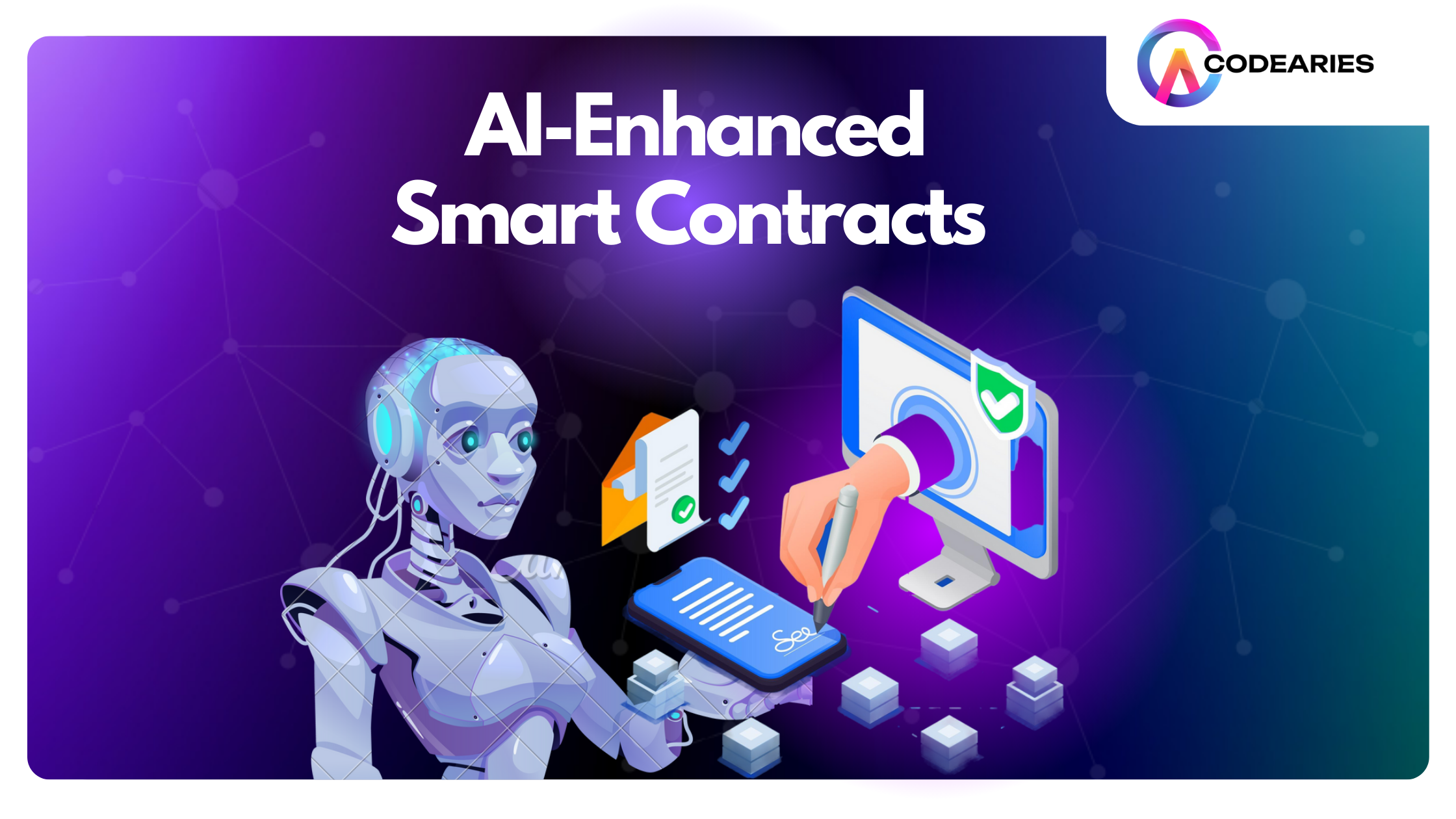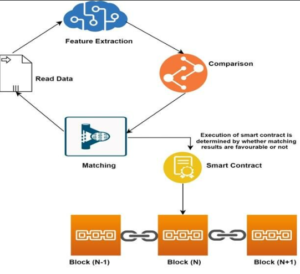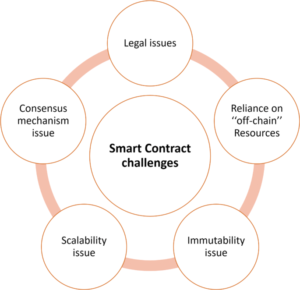
The development, implementation, and management of smart contracts are undergoing a paradigm shift driven by the convergence of blockchain technology and artificial intelligence (AI). As industries increasingly rely on blockchain for secure, transparent, and automated processes, integrating AI into smart contract development promises unprecedented efficiency, automation, and security.
This article delves into the transformative impact of AI on smart contract development, exploring its benefits, challenges, and future potential.
The Convergence of AI and Blockchain: A Game-Changer
Blockchain technology has made significant strides in decentralizing digital transactions, ensuring transparency, and enhancing security. The impact of blockchain technology had progressively driven global economic growth by 2020, and it is projected to contribute 1.76 trillion dollars to the global economy by 2030 by increasing traceability and trust levels. However, the integration of AI into this ecosystem is poised to take these capabilities to new heights. AI-enhanced smart contracts leverage machine learning algorithms, natural language processing, and predictive analytics to automate decision-making processes, optimize performance, and reduce human error.
AI’s role in blockchain isn’t merely supportive; it’s transformative. By analyzing vast amounts of data in real time, AI can enhance the accuracy and efficiency of smart contracts, ensuring that they are executed flawlessly. This synergy between AI and blockchain opens up new possibilities for industries ranging from finance and supply chain management to healthcare and legal services.
What Are AI-Enhanced Smart Contracts?
These are self-executing agreements with the terms of the contract directly written into lines of code, which are enhanced by AI to improve their functionality and efficiency. Unlike traditional smart contracts, which rely solely on predefined conditions and manual inputs, AI-enhanced smart contracts utilize AI algorithms to analyze data, predict outcomes, and make informed decisions in real time.

For example, in a supply chain scenario, an AI-enhanced smart contract can monitor inventory levels, predict demand fluctuations, and automatically trigger orders when stock levels drop below a certain threshold. This level of automation reduces the need for human intervention, minimizes delays, and ensures that contractual obligations are met with greater precision.
Key Technologies Behind AI-Enhanced Smart Contracts
Several technologies are central to AI-enhanced smart contracts:
- Machine Learning: Facilitates smart contracts’ ability to learn from data, recognize patterns, and make autonomous decisions.
- Natural Language Processing (NLP): Enables smart contracts to understand and execute human language instructions, making them more accessible.
- Predictive Analytics: Utilizes historical data to forecast future outcomes, aiding proactive contract management and risk reduction.
- Blockchain Oracles: Provide smart contracts with external data, ensuring that contract conditions are based on accurate and current information.
The Impact of AI on Smart Contracts: Key Benefits
1. Enhanced Automation and Efficiency
One of the most significant advantages of AI-enhanced smart contracts is their ability to automate complex processes that traditionally require manual oversight. By leveraging AI’s data processing capabilities, these contracts can execute tasks faster and more accurately than ever before. This automation reduces the need for intermediaries, cutting down on costs and time.
2. Improved Accuracy and Reduced Errors
Human errors in contract execution can lead to significant financial losses and legal disputes. AI-enhanced smart contracts minimize these risks by ensuring that every transaction is executed according to the predetermined terms. AI algorithms can also detect anomalies or inconsistencies in data, allowing for immediate corrections and reducing the likelihood of errors.
3. Predictive Analytics for Better Decision-Making
AI’s predictive analytics capabilities are invaluable in smart contract development. By analyzing historical data and current trends, AI can predict future outcomes and suggest the best course of action. This proactive approach enables organizations to make informed decisions, optimize their operations, and stay ahead of potential challenges.
4. Enhanced Security and Fraud Prevention
Blockchain’s inherent security features, such as immutability and decentralization, are further strengthened by AI. AI algorithms can identify suspicious activities, such as unauthorized access or fraudulent transactions, and take immediate action to prevent breaches. This added layer of security is crucial in industries where data integrity and confidentiality are paramount.
5. Dynamic Contract Adaptation
Traditional smart contracts are static, meaning that once they are deployed, they cannot be altered. AI-enhanced smart contracts, however, can adapt to changing circumstances. By continuously analyzing relevant data, AI can update the contract’s terms in real time, ensuring that they remain aligned with the parties’ needs and external conditions.
Challenges in AI-Enhanced Smart Contract Development
While the benefits of AI-enhanced smart contracts are undeniable, their development and implementation are not without challenges.

1. Technical Complexity
Developing AI-enhanced intelligent contracts requires a deep understanding of both AI and blockchain technologies. This complexity can be a barrier for organizations that need more expertise. Furthermore, the integration of AI into smart contracts can introduce new technical challenges, such as ensuring that the AI algorithms are secure and operate as intended.
2. Ethical Considerations
The use of AI in decision-making processes raises important ethical questions. For instance, how can we ensure that AI-enhanced smart contracts make fair and unbiased decisions? What happens if the AI makes an error or a decision that has unintended consequences? These ethical considerations must be addressed to ensure that AI-enhanced smart contracts are developed and used responsibly.
3. Regulatory Compliance
As with any emerging technology, regulatory frameworks for AI-enhanced smart contracts are still evolving. Organizations must navigate complex legal landscapes to ensure that their AI-enhanced smart contracts comply with relevant laws and regulations. This can be particularly challenging in cross-border transactions, where different jurisdictions may have different requirements.
Real-World Applications of AI-Enhanced Smart Contracts
The potential of AI-enhanced smart contracts is being realized across various industries, where they are driving innovation and efficiency.
1. Finance and Banking
In the financial sector, it revolutionized how transactions are conducted. For example, they can automate loan approvals by analyzing a borrower’s credit history and predicting their ability to repay the loan. They can also streamline the settlement of securities trades, reducing the risk of errors and delays.
2. Supply Chain Management
Supply chains are complex networks that involve multiple parties, each with its contractual obligations. AI-enhanced smart contracts can monitor and enforce these obligations in real time, ensuring that goods are delivered on time and that payments are made promptly. This automation reduces the risk of disputes and enhances the efficiency of supply chain operations.
3. Healthcare
Healthcare organizations can use AI-enhanced intelligent contracts to automate the management of patient data, ensuring that medical records are updated and securely exchanged among various providers. In addition, they can use these smart contracts to handle insurance claims, process payments, and automatically confirm the accuracy of claims without needing human intervention.
4. Legal Services
The legal industry is another area where AI-enhanced smart contracts are making a significant impact. These contracts can automate the enforcement of legal agreements, such as leases or employment contracts, reducing the need for costly and time-consuming litigation. AI can also analyze legal documents to identify potential risks and suggest amendments, ensuring that contracts are robust and compliant with relevant laws.
The Future of AI-Enhanced Smart Contract Development
As AI and blockchain technologies continue to evolve, the potential for AI-enhanced smart contracts will only grow. In the future, we can expect to see even more sophisticated AI algorithms being integrated into smart contracts, enabling them to handle increasingly complex tasks.
1. Integration with IoT
One exciting possibility is the integration of AI-enhanced smart contracts with the Internet of Things (IoT). For example, a smart contract could automatically trigger a payment when an IoT device confirms that a delivery has been made. This level of automation would be particularly valuable in industries such as logistics and supply chain management.
2. Increased Use of Decentralized Finance (DeFi)
Decentralized finance (DeFi) is an area of blockchain technology that is rapidly gaining traction. AI-enhanced smart contracts have the potential to play a key role in DeFi, automating complex financial transactions and reducing the risk of fraud. As DeFi continues to grow, the demand for it is likely to increase.
3. Greater Adoption Across Industries
While AI-enhanced smart contracts are already being used in a variety of industries, their adoption is still in its early stages. As organizations become more familiar with the technology and its benefits, we can expect to see wider adoption across different sectors. This will drive further innovation and help to unlock the full potential of AI-enhanced smart contracts.
Employing Codearies to Create AI-Enhanced Smart Contracts
Step into the future of blockchain technology with Codearies. Our innovative approach combines the power of AI with blockchain to craft smart contracts that are not only intelligent but also incredibly secure and efficient. We’d like you to let us transform your vision into reality with solutions tailored to meet your unique needs.
Our Cutting-Edge Development Process
Define Your Vision
You can begin by articulating your goals for AI-driven smart contracts, making sure that every detail aligns with your strategic objectives.
Choose the Perfect Tools
Harness the best platforms and tools to build your smart contracts with precision and innovation.
Rigorous Testing and Refinement
We put your contracts through comprehensive testing and optimization to guarantee flawless performance and reliability.
Launch and Oversee
Deploy your smart contracts on the blockchain and keep a close eye on their performance to ensure ongoing success and adaptability.
Partner with Codearies for Tomorrow’s Technology
Embrace the future with Codearies, where groundbreaking AI meets advanced blockchain technology. Elevate your projects with our expert guidance and innovative solutions. Please book your free consultation today and let us help you redefine what’s possible in smart contract development!
Conclusion
AI-enhanced smart contract development is setting new standards in the blockchain ecosystem, delivering unparalleled security, efficiency, and adaptability. By integrating AI, smart contracts are evolving to handle complex tasks with minimal human intervention. As technology advances, it will play a pivotal role in shaping the future of digital transactions, offering transformative benefits to industries worldwide.
FAQs
Can Smart Contracts Be Automated?
Yes, smart contracts automate processes by executing predefined actions when specific conditions are met without requiring human intervention. This automation makes processes faster more reliable, and reduces the risk of errors.
What Is a Real Example of a Smart Contract?
A real-world example of a smart contract is an insurance payout agreement. If a flight is canceled, the smart contract can automatically verify this information and trigger an instant payout to the policyholder, streamlining the claims process and eliminating the need for manual verification.
How Does Smart AI Work?
Smart AI refers to AI systems that can learn from data, make decisions, and improve over time. These systems use machine learning algorithms to analyze patterns, predict outcomes, and optimize processes, making them valuable for tasks requiring adaptability and efficiency.
What Are AI Contracts?
AI contracts are intelligent contracts enhanced with artificial intelligence capabilities. They can analyze complex data, make autonomous decisions, and adapt to new situations, making them more dynamic and responsive compared to traditional smart contracts.


